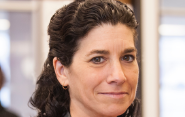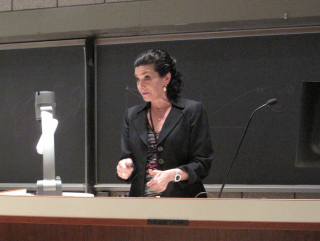Deborah Estrin, Nyqust Lecturer, On How Small Data Can Help You

As a patient, how do you accurately describe your level of pain? Or give a clear impression of your mood over a period of weeks?
In an era of Big Data – those sets of information so large we need new technologies and methods tosort it all out – it's common to overlook the importance of what Dr. Deborah Estrin calls "small data." It's information that can give us very detailed pictures of ourselves as individuals, and it's increasingly playing a major role in health care.
 Estrin, a professor of computer science at Cornell Tech, came to Yale School of Engineering & Applied Science Wednesday as the speaker for the 2016 Nyquist Lecture in Electrical Engineering. The founder of the Jacobs Institute's Health Tech Hub and a co-founder of Open mHealth, Estrin currently focuses on mobile health and small data, leveraging the pervasiveness of mobile devices and digital interactions for health and life management.
Estrin, a professor of computer science at Cornell Tech, came to Yale School of Engineering & Applied Science Wednesday as the speaker for the 2016 Nyquist Lecture in Electrical Engineering. The founder of the Jacobs Institute's Health Tech Hub and a co-founder of Open mHealth, Estrin currently focuses on mobile health and small data, leveraging the pervasiveness of mobile devices and digital interactions for health and life management.
"Big data is hyped to no end, but it deserves the hype," she told the audience in Davies Auditorium. But small data is also vital, particularly by filling in large gaps of information between birth and death.
Genomics are a very significant factor when it comes to a person's health outcomes, and it's all there at the time of birth. What happens after that, though? "Genomics are not enough," said Estrin, who served for 10 years as the founding director of the NSF-funded Science and Technology Center for Embedded Networked Sensing (CENS) at UCLA. "One of the key utilities in small data is helping us understand those behavioral components that contribute to the onset and progression of chronic disease."
Everything we do, Estrin said – what we eat, drink, and breathe, the medicines we take, and how well we sleep - "have a huge role to play in what we die from." Or how many steps did you walk last week, and was that more or less than your normal weekly jaunts. And to get much of that information, just look to your mobile phone.
"With the coincidence of these," she said, holding up her smart phone, "and the proliferation of digital services of all kinds, you now have so much data about people in their everyday life."
Estrin noted that every smart phone has an accelerometer that measures movement, and from those very detailed metrics, you can tell a lot about patients' daily activities - and that tells us a lot about their state of health. For instance, doctors often ask patients to rate their level of pain on a scale of 1 to 10. It's an unreliable metric for many reasons. A patient's pain level at any particular moment might vary widely over a number of days, or patients might understate their pain because they don't want to complain.
"That is a really bad feedback loop," she said. "Detecting a 10 percent increase in mobility or a 10 percent decrease in pain is a very difficult thing for us to perceive." But the amount of movement, or number of social interactions (phone calls or texts, for example), can put a finer point on you're feeling mentally and physically.
Location patterns are another important data point. With phones tracking users' locations, you can keep track of where they are during the day. That alone can give doctors plenty of information about how well patients are coping with conditions ranging from arthritis and migraine headaches to anxiety and depression.
"What time is somebody leaving for work in the morning? How many hours do spend outside of the house in a day?" she said. "Those two questions are really important, specific measures of patient function and recovery."
Named in honor of Harry Nyquist, Ph.D. '17, an important contributor to stability theory and information theory through his research into a quantitative understanding of thermal noise, data transmission and negative feedback, the Nyquist Lectureship is made possible through a generous gift from J. Robert Mann, Jr., B.E. '51, Chairman and CEO of E-J Electric Installation Co., founded in 1899. Mann is the sponsor of the J. Robert Mann, Jr., Yale Engineering Student Center and a recipient of the Yale Medal, Yale's highest award to honor outstanding individual service to the University.

